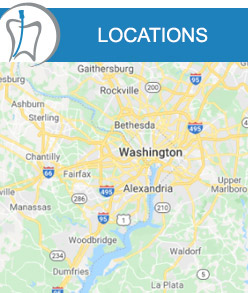Reasons to See an Endodontist in Washington DC
Our endodontists, Dr. Ali Manesh, DMD, and Dr. Moein Darjani, DDS, are specialists in diagnosing tooth pain and performing procedures on the inside of your teeth. Visit our clinic today for your oral health needs. We are conveniently located at 1145 19th Street NW, Suite 314, Washington, DC 20036. For more information, contact us or schedule an appointment online.


Table of Contents:
Why do I need to see an endodontist?
What does an endodontist do besides root canals?
What symptoms indicate a root canal is needed?
Is it better to go to a dentist or endodontist for a root canal?
An endodontist is a dental specialist who is concerned with the diagnosis and treatment of conditions that affect the tooth pulp and surrounding tissues of the tooth. The inside of the tooth, known as the dental pulp, contains the nerves and blood vessels that keep the tooth alive. The word “endodontic” comes from the Greek roots “endo-”, meaning inside, and “odont-,” meaning tooth. An endodontist is a dentist who has completed several years of specialized training in endodontics after graduation from dental school.
The main reason you will probably see an endodontist is to have a root canal. Endodontists are the leading specialists in this type of procedure and have the most experience, sometimes performing over 20 root canals a week. There may be other reasons, too, like when a tooth is badly damaged and the sensitive tissues inside are exposed; visiting an endodontist is the best hope to save these teeth.
Endodontists are perhaps best known for specializing in root canal therapy, but they also perform a number of other procedures in order to save a person’s teeth. These include:
Apicoectomy — A root end surgery, also known as an apicoectomy, is a type of endodontic surgery that is used to preserve a tooth or teeth. While both treatments are used to clear out an infected or damaged tooth root, this approach is different from a root canal procedure, as instead of drilling down into the tooth from the top, an apicoectomy involves going through the gum. Therefore, this approach is much more invasive than root canal therapy and is only used when a root canal is unlikely to be successful, or if there are other complications involved.
Traumatic Injuries to Teeth — An endodontist’s main goal is to save a tooth, if possible, including when it comes to facial or jaw trauma that damages the teeth. In the case of an accident, such as a fall or a blow to the head or face, teeth may become chipped, cracked, knocked loose, or completely knocked out. An endodontist is often the best hope to save these teeth; they can assess the damage and determine the best course of action. When teeth are cracked or chipped, the damage often affects the root, so endodontic treatment or surgery may be necessary to repair the root and save the tooth.
There are many symptoms that indicate when a root canal is needed, but the only way to know for sure is by visiting a dentist, or better yet, an endodontist. If you notice any of the following symptoms, it is imperative to schedule an appointment with an endodontist as soon as possible:
• Persistent pain
• Sensitivity to heat and cold
• Tooth discoloration
• Swollen gums
• Pain when eating or touching the tooth
• A chipped or cracked tooth
• Tooth mobility
Both dentists and endodontists can perform root canal therapy, however, endodontists have much more practice performing these procedures, oftentimes over ten times the amount of hands-on experience. For example, a dentist may perform one or two root canals a week, whereas an endodontist typically performs over twenty. Furthermore, endodontists have specialized equipment and technology that is specifically designed to improve the efficacy and accuracy of root canal procedures. Lastly, since endodontists only see one type of patient (because they are so specialized), they are often more flexible than general dental practices.
In conclusion, if you need a root canal, you can choose to go with either an endodontist or dentist, depending on your personal preference. It is important to note, however, that advanced, complex, or severe situations may warrant a visit to an endodontist, as these complicated cases fall outside a dentist’s experience and training.
The specialists at Ideal Endodontics in Washington, DC, are here to help you with all of your endodontic-related needs. Contact us today or book an appointment with our endodontist, or visit our clinic conveniently located at 1145 19th Street NW, Suite 314, Washington, DC 20036. We serve patients from Washington DC, Arlington VA, Bethesda MD, Alexandria VA, and Silver Spring MD. We look forward to serving you!







